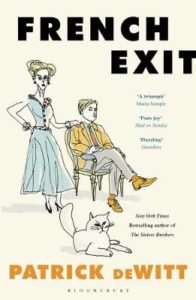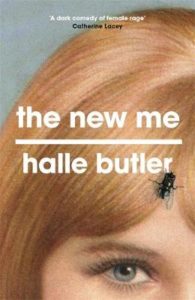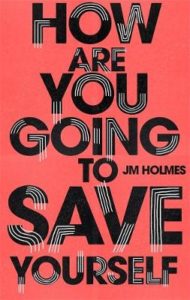 This second batch of June paperbacks is as jam-packed with potential goodies as the first, a few of which I’ve already sampled including Sonia Zinovieff’s Putney which explores the fallout of childhood abuse through Ralph who’s aroused by Daphne’s boyish beauty when she is nine and he is twenty-seven. Daphne is the child of bohemian parents caught up in their own affairs, looking anywhere but at what’s happening under their noses. Forty years later, Ralph is oblivious to Daphne’s chaotic, rackety life while she works on a collage commemorating her time with him in a flat a stone’s throw away from her childhood home. This subject could so easily have been mishandled but Zinovieff explores it with consummate skill in a thoroughly accomplished novel.
This second batch of June paperbacks is as jam-packed with potential goodies as the first, a few of which I’ve already sampled including Sonia Zinovieff’s Putney which explores the fallout of childhood abuse through Ralph who’s aroused by Daphne’s boyish beauty when she is nine and he is twenty-seven. Daphne is the child of bohemian parents caught up in their own affairs, looking anywhere but at what’s happening under their noses. Forty years later, Ralph is oblivious to Daphne’s chaotic, rackety life while she works on a collage commemorating her time with him in a flat a stone’s throw away from her childhood home. This subject could so easily have been mishandled but Zinovieff explores it with consummate skill in a thoroughly accomplished novel.
I reviewed Finnish writer Philip Teir’s debut, A Winter War, back in 2015 when I described it as the perfect winter read. It may seem a bit lazy but it’s hard to resist describing The Summer House as the perfect summer read. Julia, Erik, ten-year-old Anton and twelve-year-old Alice are off to Mjölkviken for the summer where Erik plans to put his work troubles behind him and Julia wants to finish her novel but finds herself pulled back into her past. Teir’s second book explores the dynamics of modern family life with the same empathy and deftness as he did in his first. Well worth packing if you’re after an intelligent holiday read.
As is Patrick deWitt’s French Exit, a pleasingly caustic caricature of the wealthy upper classes which takes its readers from New York City to Paris in the company of Frances Price, her son Malcolm and Small Frank, their cat. After years of jaw-dropping extravagance Frances is running out of money so why does she spend much of her time trying to divest herself of the 185,000 euros she has stashed in her handbag, and why is such an ancient cat so important to her. I’ve been a keen fan of deWitt’s fiction since reading his darkly comic ripping yarn, The Sisters Brothers and although the latter remains my favourite, French Exit is a welcome treat.
which takes its readers from New York City to Paris in the company of Frances Price, her son Malcolm and Small Frank, their cat. After years of jaw-dropping extravagance Frances is running out of money so why does she spend much of her time trying to divest herself of the 185,000 euros she has stashed in her handbag, and why is such an ancient cat so important to her. I’ve been a keen fan of deWitt’s fiction since reading his darkly comic ripping yarn, The Sisters Brothers and although the latter remains my favourite, French Exit is a welcome treat.
Cherise Wolas’ The Family Tabor sounds rather more conventional. Harry Tabor is about to be honoured as Man of the Decade in recognition of his work with the many Jewish refugees he’s helped to settle in America. Years ago, Harry uprooted his own family taking them across the States from Connecticut to the South West. ‘Wolas examines the five members of the Tabor family as they prepare to celebrate Harry. Through each of their points of view, we see family members whose lives are built on lies, both to themselves and to others, and how these all come crashing down during a seventy-two-hour period’ according to the blurb which sounds highly entertaining.
Rick Gekoski’s A Long Island Story is set in the summer of 1953 when the Grossmans and their two children relocate from Washington DC to Long Island. The move unsettles the couple who  begin to wonder if their lives might have been different, and if their marriage is worth fighting for. It’s described by the publishers as ‘a portrait of a couple in crisis, of a unique and fascinating period in US history and of a seemingly perfect family fighting their demons behind closed doors’ which sounds quite promising to me.
begin to wonder if their lives might have been different, and if their marriage is worth fighting for. It’s described by the publishers as ‘a portrait of a couple in crisis, of a unique and fascinating period in US history and of a seemingly perfect family fighting their demons behind closed doors’ which sounds quite promising to me.
I’ve always been surprised at how few novels are set in offices given how many of us have worked in them and what political hothouses they can be. Halle Butler’s The New Me looks at the life of a thirty-year-old temp as she watches her permanently employed peers and wonders if she will ever join their ranks. Then a vacancy arises and Millie contemplates the possibility of a life of stability and perks. ‘Will it bring the new life Millie is envisioning – one involving a gym membership, a book club, and a lot less beer and TV – finally within reach? Or will it reveal just how hollow that vision has become?’ ask the publishers.
Colleagues of a very different sort feature in Aja Gabel’s The Ensemble. Jana, Brit. Daniel and Henry are musicians, ill-suited as friends but drawn together by their art. Their chequered careers encompass ‘devastating failure and wild success, heartbreak and marriage, triumph and loss, betrayal and enduring loyalty. They are always tied to each other – by career, by the intensity of their art, by the secrets they carry, by choosing each other over and over again’ apparently. This one could go either way but I like the idea of a disparate group of characters locked together by their work.

I’m finishing off June’s paperbacks with J M Holmes’ How Are You Going to Save Yourself about four young men who’ve grown up together but have drifted apart in adulthood as they try to cope with society’s expectations, family pressures and their own self-images. Described as ‘both humorous and heart-breaking’ it’s ‘a timely debut about sex, race, family and friendship’, apparently which sounds good to me.
That’s it for June’s paperbacks. A click on the first three titles will take you to my review, and to a more detailed synopsis for the other five. If you’d like to catch up with the first instalment it’s here. New novels are here and here.


The Summer House does indeed sound like a lovely holiday read. French Exit is perhaps the book which appeals to me the most from your excellent selection. I haven’t read De Witt before but it does sound like an intelligent, compelling read.
French Exit also has a cat you won’t forget in a hurry!
I’ve read Putney and agree that its subject matter is handled sensitively and well worth a read.
I was wary of it when it was pitched to me but she handles a tricky subject with empathy.
Some great reading there. I’m keen on Putney and The New Me, having already enjoyed the DeWitt.
I know you’re a fellow deWitt fan, Annabel! I like the look of The New Me, hyped as it is.
Lots of treats, as you say! I’d forgotten about Putney but I do remember thinking it sounded really interesting. French Exit is top of my list as I really enjoyed The Sisters Brothers.
Still my favourite deWitt but French Exit is an enjoyable romp with a pleasing sharp edge.
“an intelligent holiday read” – now that’s something you don’t often find in the lists of books to take on holiday that will be coming our way soon. The compilers seem to think we lose all our brain cells the minute the sun comes out
I couldn’t agree more. Why we’re all expected to slip our brains into neutral I really don’t know.
I don’t do lounge about/beach holidays but if I did I would need something meaty to keep me from feeling frustrated with the lack of activity.
Quite!
As usual, so many good things. I’ve got a soft spot for books set in workplaces (and particularly offices, but also restaurants and bars and kitchens, which I think I’ve mentioned before) so the Halle Butler appeals to me.
Did you know that the deWitt was released straight to paperback here? I find that odd – you’d think that we, in Canada, would have gone the other way perhaps. Maybe he is more firmly entrenched as an “American” (i.e. North American, but Los Angeles American) author than I thought.
Oh yes, there are some great novels set in restaurants. That is odd about the deWitt. I was sent a proof but I’ve just checked and it was definitely published in hardback last year here in the UK.
Weird! *shrugs, smiling*